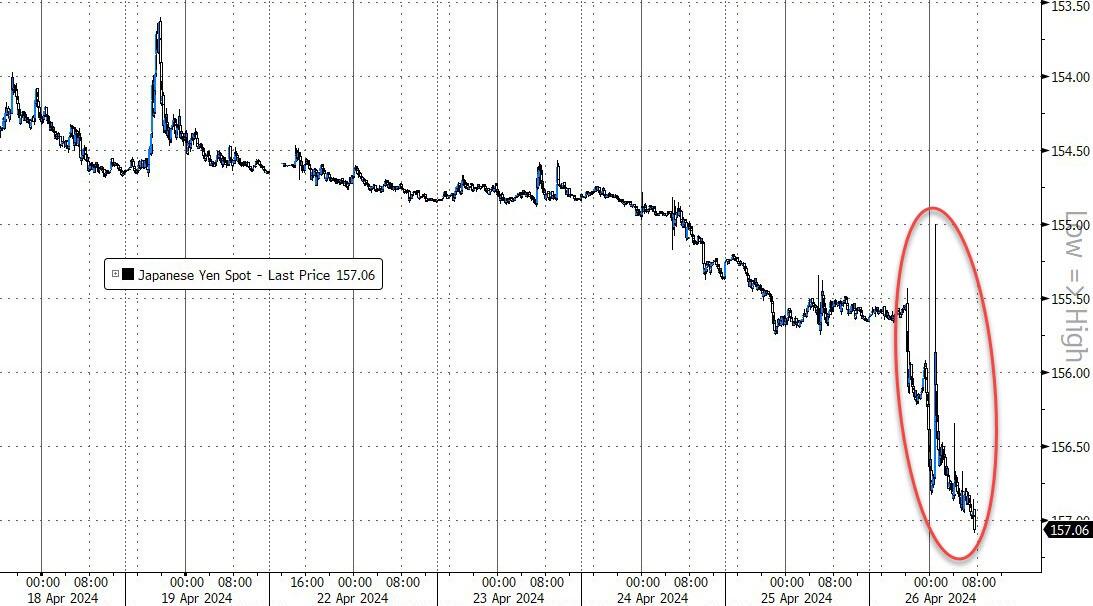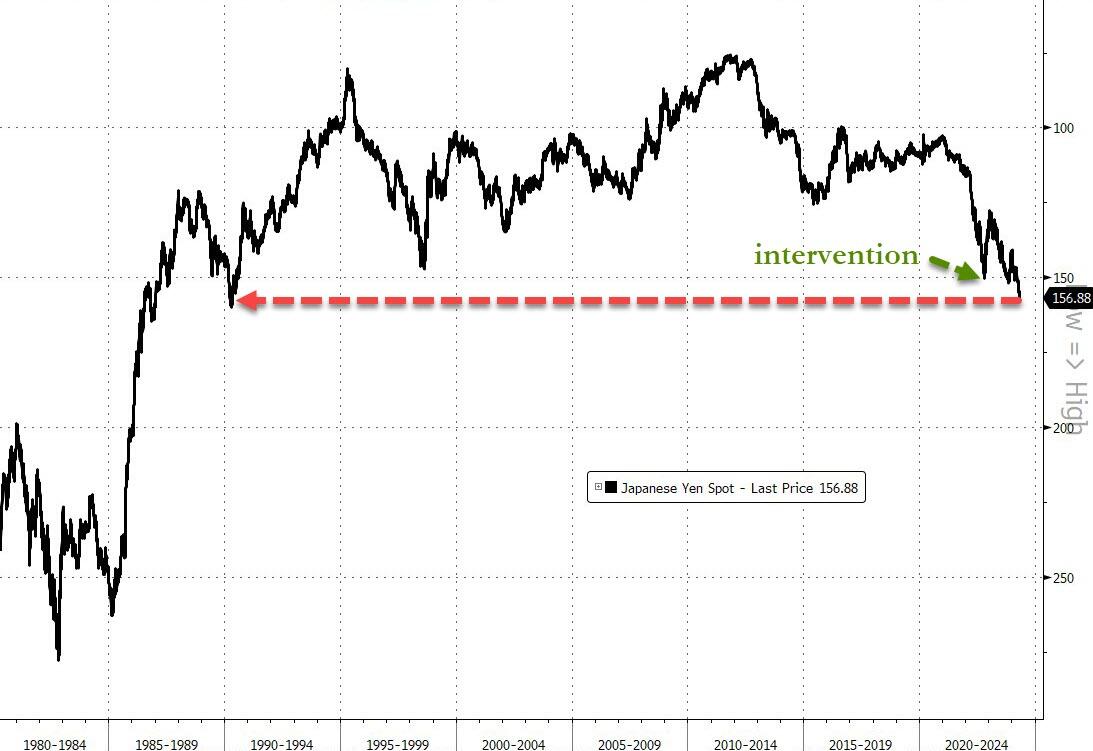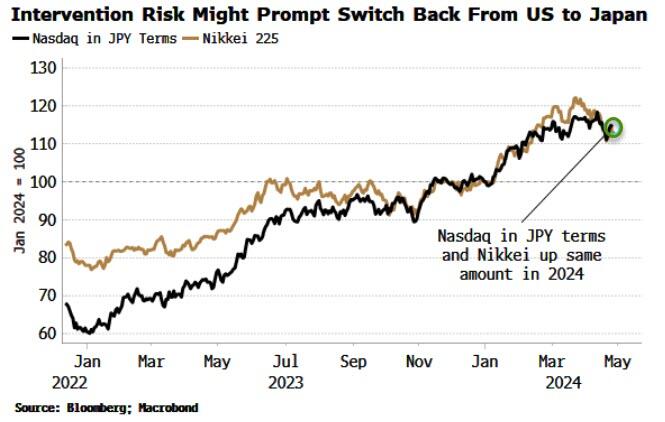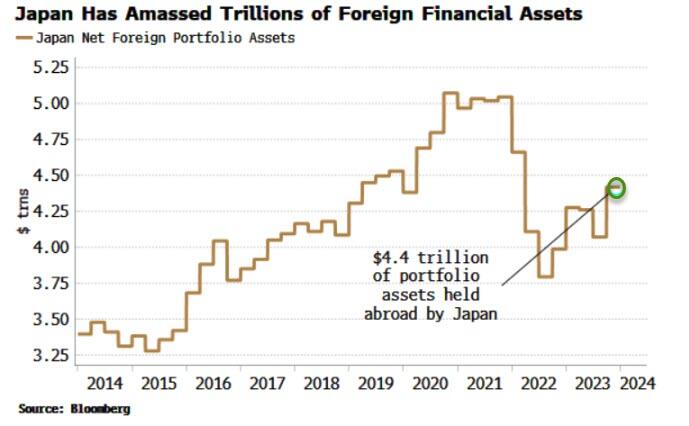As we have been warning for several years now, what cannot last, won't.
The canary in the financial coal mine is the Yen. At 160 yen per dollar the money is entering junk level and will start having a negative impact on other markets and currencies.
Remember November 2019 when the Repo market started to break apart? A month later we had the Covid crisis.
As we have been warning now for the last year or so: Expect something major happening in the coming few months, most likely during the May/June window.
A dollar rate above 5% is deadly for real estate, individuals and US banks. Lowering rates while inflation is flaring up is almost impossible less the Fed loses credibility. Japan was counting on lower rates to minimize the interest rate spread and the pressure on their currency. Now that it can't happen, Japan is stuck. Raising interest rates even 0.25% is economic suicide. Not raising rates is Yen suicide. The BoJ has finally painted itself in a corner.
We are about to enter choppy waters, in the US, in Japan and of course in Europe. Something is about to break badly. Expect someone, somewhere to preempt such an event. 9, 8, 7, 6, ... The countdown is on!
US equity futures swung between gains and losses and traded near session
highs as US traders walked to their desks on Monday morning after a
rollercoaster day for the Japanese yen, which increasingly looks like
some 3rd world banana republic currency instead of belonging to the
world's 3rd largest economy, and which first plunged below 160 vs the
USD - the lowest level since 1990 amid dismal volumes thanks to the
Japanese market holiday on Monday - only to soar more than 500 pips in
what is now the first confirmed BOJ intervention since
2022. Futures were buoyed by rising earnings optimism as traders looked
ahead to another very busy week for company results, and as of 7:40am,
S&P futures gained 0.2% with Nasdaq futures rising 0.3%, boosted by
another surge in Tesla shares. 10Y Treasury yields fell four basis
points to 4.62% ahead of today's announcement by the Treasury of its
funding needs for the coming quarter, while the dollar weakened. Oil
retreated, with Brent first trading below $89 a barrel, only to rebound
higher amid the endless speculation that a peace deal between Israel and
Hamas is coming that would reduce geopolitical tensions in the Middle
East (spoiler alert: there will be no deal). Gold rose and bitcoin fell.
The Japanese Yen strengthened sharply overnight after crashing to its lowest level since April 1990, breaking 160/USD.
The FT reports that traders in Hong Kong, Australia and London said it was
“highly likely” that the recovery was due to Japan’s finance ministry
selling dollar reserves and purchasing the Japanese currency for the
first time since late 2022.
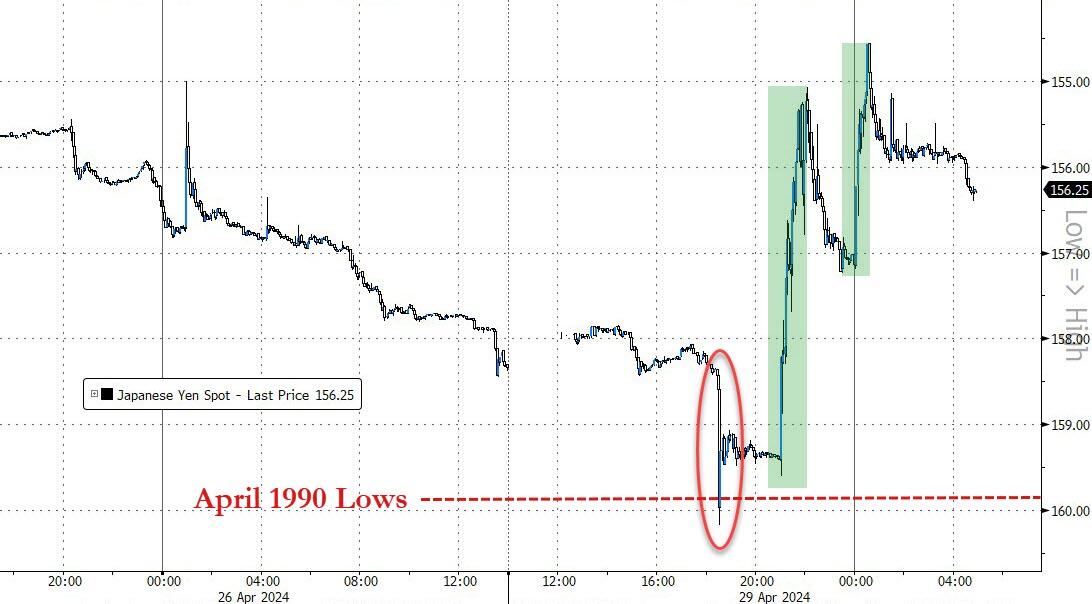
While
analysts suggested the size and speed of the jump smacked of
intervention, some traders questioned that conclusion and said Japanese
banks sold dollars for customers as it rallied.
Japan’s top currency official, Masato Kanda, chose to keep investors guessing by declining to comment.
"It
is difficult to ignore the bad effects that these violent and abnormal
movements [in currencies] will cause for the nation's economy," Kanda told reporters on Monday.
Dow Jones reported authorities stepped in to support the yen, citing people familiar with the matter.
It
is unlikely to be the last time Japan intervenes in the currency market
this year, given that U.S. interest rates are likely to remain high,
said Alvin Tan, head of Asia foreign-exchange strategy at RBC Capital
Markets.
"We will have a tug of war going forward between Tokyo and the market," he said.
* * *
The yen crashed in early Asia trading, tumbling to match is exact lows from April 1990
in what is being blamed on a 'fat finger' trade or multiple
barrier-option trades being triggered, by sources that have literally no
idea.
The plunge extended Friday's big drop which followed BoJ Governor Ueda's apparent lack of interest in doing anything about the yen's decline, claiming it had 'no impact' on the currency's inflation picture.
“Currency rates is not a target of monetary policy to directly control,” he said.
“But currency volatility could be an important factor
in impacting the economy and prices. If the impact on underlying
inflation becomes too big to ignore, it may be a reason to adjust
monetary policy.”
In fact, policymakers have repeatedly warned that depreciation won’t be tolerated if it goes too far too fast.
Finance
Minister Shunichi Suzuki reiterated after the BoJ meeting that the
government will respond appropriately to foreign exchange moves.
Potential
triggers for interventions are public holidays in Japan on Monday and
Friday next week, which bring the risk of volatility amid thin trading.
“Should
the yen fall further from here, like after the BOJ decision in
September 2022, the possibility of intervention will increase,”
said Hirofumi Suzuki, chief currency strategist at Sumitomo Mitsui
Banking Corp.
“It is not the level but it’s the speed that will trigger the action.”
Well currency volatility is what he has now...
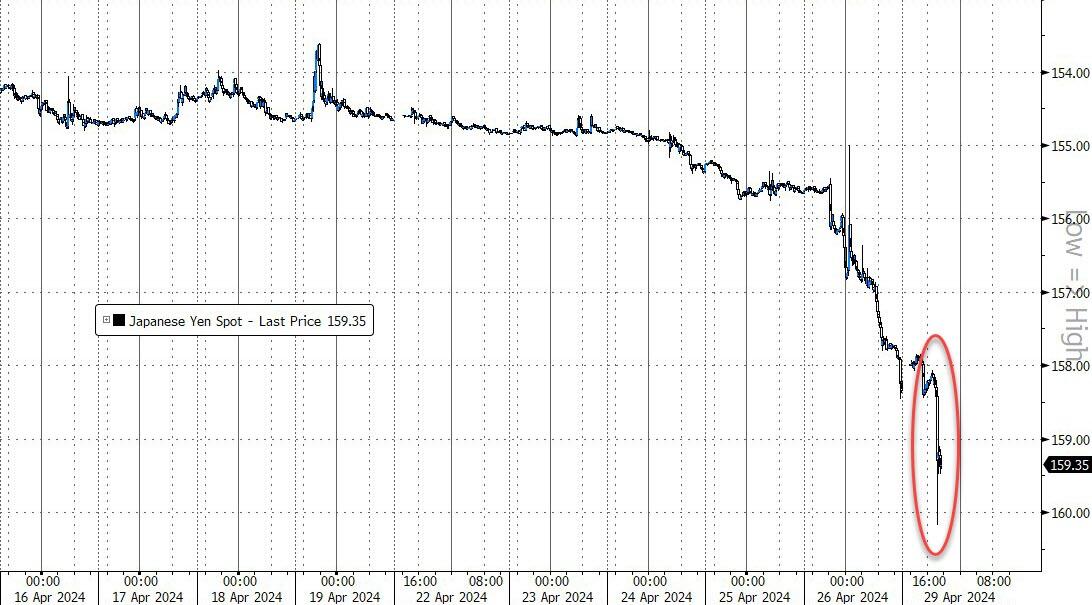
Source: Bloomberg
The sudden drop pushed USDJPY perfectly to its April 1990 highs to the tick...
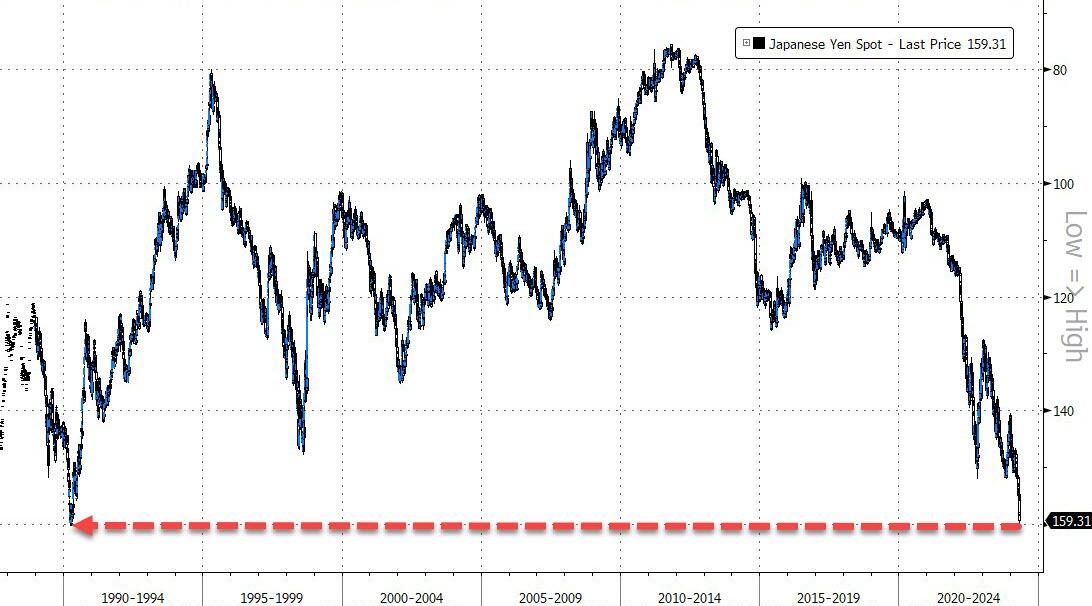
Source: Bloomberg
The currency pain was all focused in the Japanese market as EUR and GBP strengthened against the USD...
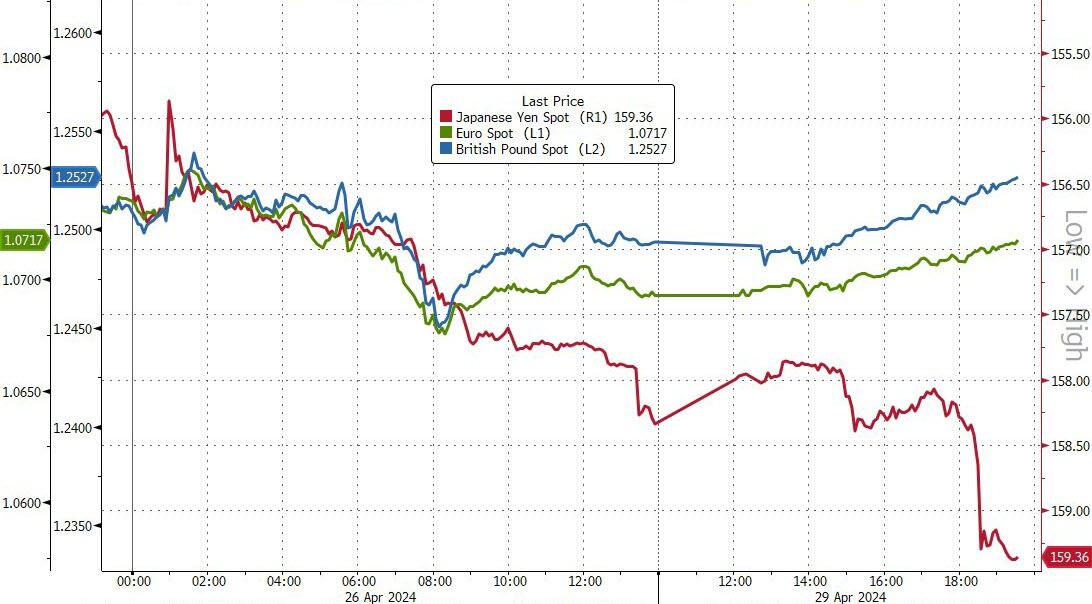
Source: Bloomberg
Perhaps
even more notably, the yen puked relative to the Chinese yuan, hitting
22 for the first time since 1992 and putting further pressure on Beijing
to potentially do something...
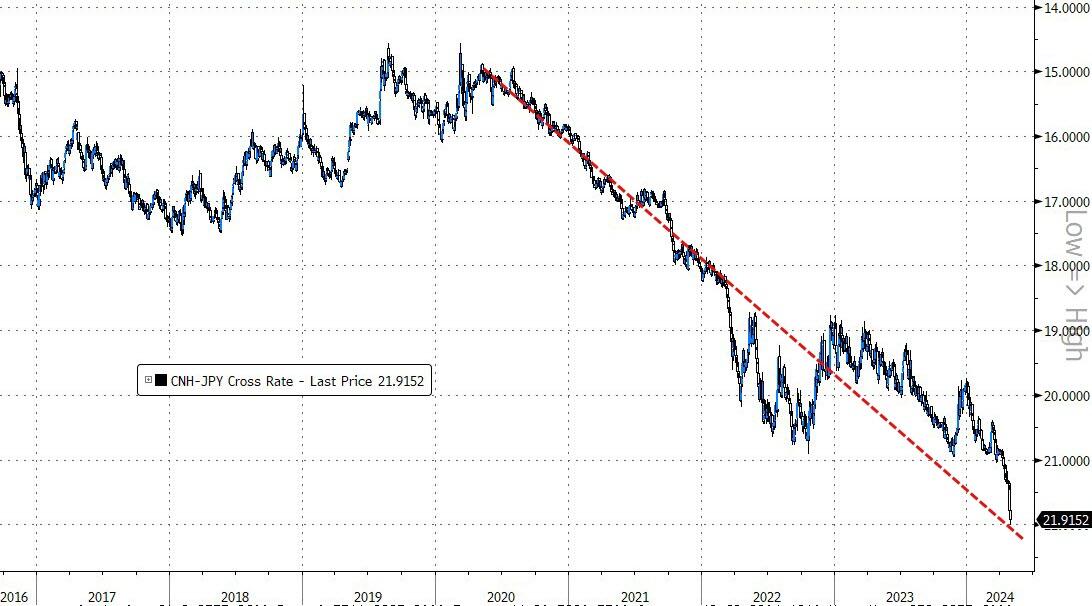
Source: Bloomberg
The
question is, of course, what will Japan's MoF/BoJ do now - if anything
as their recent excuses about 'velocity' or some such spin are now out
of the window after a 6-handle standalone surge in their currency in a
few short days (when the rest of the world's currencies are not).
“Authorities
may say they don’t target levels per se, but they do pay close
attention to the trend and the rate of change and current levels suggest
they have to act soon or risk facing a credibility crisis,” said Chris
Weston, head of research at Pepperstone Group Ltd.
“The FX market is almost taking them on like the bond vigilantes of old.”
Specifically as SocGen's FX strategist Kit Juckes noted on Friday, the yen's decline is becoming disorderly, which points to a final, potentially sharp, decline before it finds a floor.
However, as we detailed last week, the problem with intervention is that once the genie is out of the bottle… it’s hard to put it back in.
In other words, the onus should be on the BOJ to step in with a much more hawkish move than the market expects.
As Viraj Patel from Vanda Research goes on to note that "we’re
at a stage where MoF/BoJ have no choice but to intervene. The best way
would be for BoJ to hike 25bps this week. It’s not about the macro
anymore (BoJ should’ve normalized policy faster last year)."
Instead,
what is going on is that Japan's disastrous handling of its currency
has evolved into a game between speculators and officials: Specs are
short yen for good fundamental reasons (carry). At this stage, a
“surprise” hike to send a signal to markets that they are concerned
about ongoing FX weakness (and don’t test us) would be less costly to
the economy vs. a further devaluation in the yen. It also adds
an additional level of uncertainty to the BoJ/MoF reaction function -
which speculators (long carry trades) don’t like.
Meanwhile, FX
intervention - which unfortunately looks to be the MoF/BoJ’s preferred
route based on recent history - is not even a short-term fix anymore. USD/JPY
dips would be quickly bought into based on recent market chatter. A
hike goes a bit further towards solving the root cause of yen weakness -
even it’s only a marginally better option.
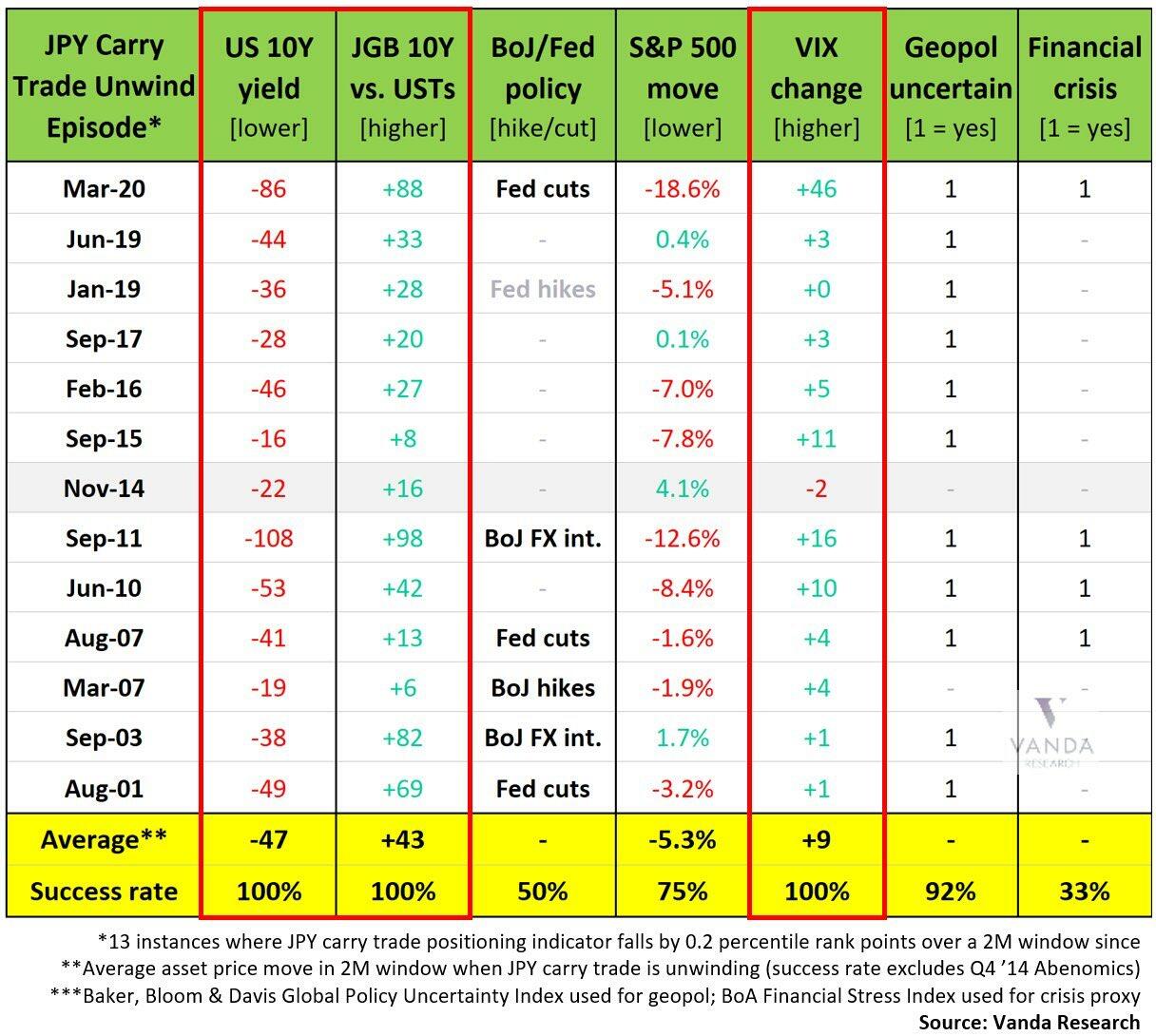
However, not everyone is convinced intervention is imminent.
In a note late last week, Deutsche Bank says the currency's decline is warranted and finally marks the day where the market realizes that Japan is following a policy of benign neglect for the yen.
We
have long argued that FX intervention is not credible and the toning
down of verbal jawboning from the finance minister overnight is on
balance a positive from a credibility perspective. The possibility of
intervention can't be ruled out if the market turns disorderly, but it
is also notable that Governor Ueda played down the importance of the yen
in his press conference today as well as signalling no urgency to hike
rates. We would frame the ongoing yen collapse around the following
points.
Yen weakness is simply not that bad for Japan. The
tourism sector is booming, profit margins on the Nikkei are soaring and
exporter competitiveness is increasing. True, the cost of imported
items is going up. But growth is fine, the government is helping offset
some of the cost via subsidies and core inflation is not accelerating.
Most importantly, the Japanese are huge foreign asset owners via Japan’s
positive net international investment position. Yen weakness therefore
leads to huge capital gains on foreign bonds and equities, most easily
summarized in the observation that the government pension fund (GPIF)
has roughly made more profits over the last two years than the last
twenty years combined.
There simply isn't an inflation problem. Japan's
core CPI is around 2% and has been decelerating in recent months. The
Tokyo CPI overnight was 1.7% excluding one-off effects. To be sure,
inflation may well accelerate again helped by FX weakness and high wage
growth. But the starting point of inflation is entirely different to the
post-COVID hiking cycles of the Fed and ECB. By extension, the
inflation pain is far less and the urgency to hike far less too. No
where is this more obvious than the fact that Japanese consumer
confidence are close to their cycle highs.
Negative real rates are great.
There is a huge attraction to running negative real rates for the
consolidated government balance sheet. As we demonstrated last year, it
creates fiscal space via a $20 trillion carry trade while also
generating asset gains for Japan's wealthy voting base. This encourages
the persistent domestic capital outflows we have been highlighting as a
key driver of yen weakness over the last year and that have pushed
Japan's broad basic balance to being one of the weakest in the world. It
is not speculators that are weakening the yen but the Japanese
themselves.
The bottom line, Deutscxhe concludes, is that for the JPY to turn stronger the Japanese need to unwind their carry trade. But
for this to make sense the Bank of Japan needs to engineer an expedited
hiking cycle similar to the post-COVID experiences of other central
banks. Time will tell if the BoJ is moving too slow and generating a
policy mistake. A shift in BoJ inflation forecasts to well above
2% over their forecast horizon would be the clearest signal of a shift
in reaction function. But this isn’t happening now.
The Japanese are enjoying the ride.
Finally, it goes without saying that the only true circuit-breaker for yen weakness is lower US yields/weak US macro, which is unlikely until the election if, as so many now speculate, there has
been a directive by the Biden admin to make the economy look as good as
possible ahead of the elections, even if that means manipulating the
data to a grotesque degree.
One added complexity for
MoF/BoJ is that their two options for tackling yen weakness indirectly
adds upward pressure to global rates/yields. They’re caught between a
rock and a hard place… and speculators know (enjoy) this.
And
finally there is China: the longer BOJ/MoF does nothing to curb the
collapse of the yen, a move which is seen a pumping up the country's
exporting base at the expense of other mercantilist nations such as
China, the higher the probability Beijing will retaliate against Tokyo
by devaluing its own currency. At which point all hell will break loose.
But, one way or another, as Goldman noted, it's crunch time for USDJPY.






